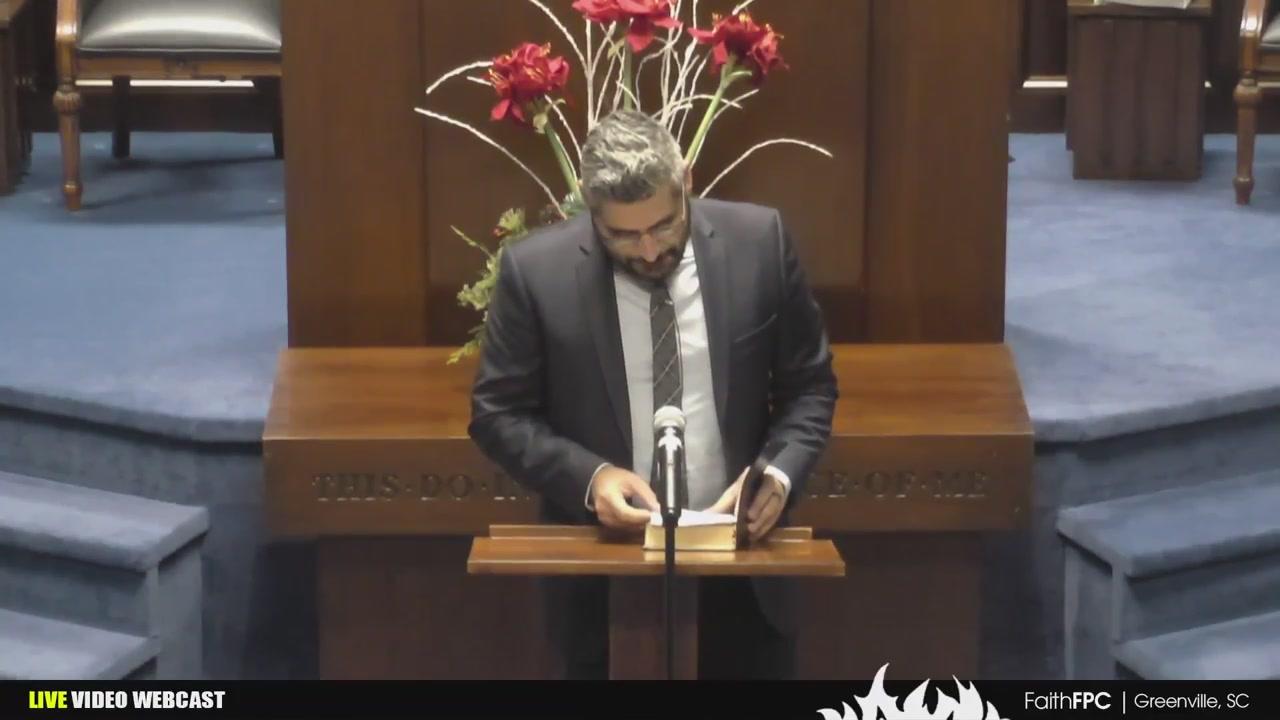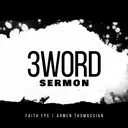
00:00
00:00
00:01
Transkrypcja
1/0
All right, let's turn to the Word of God and turn to 2 Thessalonians chapter 3, just for a moment. I wasn't sure how long he would speak for, but we have a few minutes here that I may encourage you from the Word of God. 2 Thessalonians chapter 3. Just as an aside, I had an interesting conversation with Carolyn last night and had an interesting conversation. Someone was asking me about, you know, how we, how we, the conversation came up about dealing with Christmas on the Lord's Day. And it's been our practice since we were married, I think. I think 06 was maybe the first one, some back there anyway. It's just, you push it back a day. So whatever, because it's hard for the kids. I mean, you can pull it forward. And then, you know, they open up their presents on Saturday and then you have your practices of observing and keeping the Lord's Day. And they want to, they're all fresh novel gifts and so on. They say, no, you can't touch them. You can't play with them. That's going to be tough. So we've always just put it back a day. And so let the Lord's Day be the Lord's Day and Christmas Day, whatever goes with that on on the Monday. So I just say that for it may help you in some way navigate the practical challenges. I would encourage you to The Lord's Day is always the Lord's Day and that supersedes everything else. That doesn't mean to say you can't have your turkey if you decide to set aside what you normally eat and have turkey or ham, whatever you do for Christmas Day on the Lord's Day, go ahead and do that. But just keep the Lord's Day still the Lord's Day and don't let the The things that go with Christmas Day cause you to set aside your obligations to God. We seek first the kingdom of God and His righteousness. All these things then are added onto us, so just encourage you there. 2 Thessalonians 3, I'll just read this first verse. Well, read verse one and two. Finally, brethren, pray for us that the word of the Lord may have free course and be glorified even as it is with you, that we may be delivered from unreasonable and wicked men, for all men have not faith. It is our obligation in seeing Logan and Amelia and Obadiah leave us in less than a week now, to pray for them. That's our calling. There are many other things we may do, and we may hear of needs that arise, and there may be occasion to do something more than pray, but baseline, our obligation is to pray. The Apostle Paul calls upon the church to do that very thing here in 2 Thessalonians 3 verse 1. Finally, brethren, pray for us. Pray for us. And it's not for him personally just, but the work that he's involved with. The word of the Lord may have free course, not to feel like everything you do is being hindered, and that Satan is having a field day, just kind of hindering and preventing and discouraging, but that God comes and so advances the effort that it's like the idea of free courses, it runs, it runs, it just goes forward and moves and is glorified as it has been in this particular church. So Logan has made some remarks. about God's blessing here. I am sure part of his desire is, it's not like we're a model church in every conceivable way, but we are in a more mature position, more down the road, more developed, as it were, than the church that he is going to, and so his desire is that it may be, as it is here, that God would bless God would be with him and that God would be glorified even as it is with you. As I see here, as it is in Thessalonica, as it were, so it may be where I minister and Logan would desire the same, I have no doubt. And there are those that will come and discourage and try to stand in the way and he says that we may be delivered from these kinds of people. But just leaving with you this thought, pray for us first. This is a vital work. This is a vital work. Think of what prayer does. Prayer does things, not in the sense that there's some power in the prayer, but God in His providence has ordained prayer as a means. and he advances his cause through the prayers of his people. There's no getting around that. One thing we see is that we are engaged in a work that is impossible, okay? So, Logan wants to see souls saved, as every preacher does, but as soon as you say that, you're saying, I want to see the impossible happen. The impossible. Because you can't save anyone. It's not, you're not a fireman who's trained to go into fires and you can do it. Or you're not, you know, seaside rescue and you're trained for those kind of waves and so on. You're prepared and you can jump in there and you can do it with the equipment and the training that you have. When it comes to ministry, you're engaging in something you simply can't do. Bottom line, the preacher can save no one. So, prayer. It's an answer to prayer that God does this marvelous thing where He opens hearts. That's what the language used in Acts 16, is it not? Speaking of Lydia, whose heart the Lord opened that she attended unto the things which were spoken of, pause. It's a wonderful thing, I'll tell you. I hope our brother experiences this. over and over again when you're preaching, and you can almost tell, at times you can tell, you look down on a face and you can see the conviction, the brokenness, the working of the spirit, and when they come to you at the end, you're not surprised. You can see that God was doing a work. They sat before you other weeks and nothing was going on, and then all of a sudden, that week, God speaks, something happens, their heart is opened. And they come, and it's ripe fruit. You don't have to do anything. You just talk to them a little bit, and they're just crying. How can I get peace? Men and brethren, what shall we do? Well, this is God's work to do. So we pray. We pray that God would open hearts, that God would save souls. Also, prayer is not only how hearts are opened. Prayer is how events are orchestrated. You think of how Elijah, James 5, prayed earnestly that it might not rain. And he prayed again. And heaven gave rain, and the earth brought forth her fruit. So by prayer, events are changed. Events are changed. I remember a very simple example of this when we arrived in Tasmania. And we had been there, I think, maybe two Sundays or so, and there was evidently a problem with the audio system, the sound system. Small church, there weren't any AV people, there's no, you know, Don Barretts or Stephen Lees or whatever, anyone who has an idea about those things in the church, no one really had a clue. And the lady that she communicated to me were having a problem with her sound system. And I said, well, we'll pray about it. And she looked at me and said, pray about it? Was God going to come down and fix it? And I looked at her, trying not to be, you know, I'd just arrived, didn't want to be rude, but... Yeah, I mean, you just, I mean, he does things. Things get resolved, or all of a sudden you realize, oh, that's what was missing. I mean, you've lost something, haven't you? I hope when you've lost things at times, you go, Lord, please, where is it? Where is it? And you've looked and looked, and you haven't found it, and then you pray, and no sooner have you prayed, and there it is. You find it. You pray. You pray. Things change when we pray. Elijah prayed earnestly that it might not rain, and that happened. And so, we recognize the vital aspect that prayer has in various ways. But also, prayer is how kingdoms are subdued. Hebrews 11, 33, who through faith subdued kingdoms, wrought righteousness, obtained promises, stopped the mouths of lions. And undergirding that, the fact that these people lived by faith was their prayer life. This is how you identify the genuine elect. As you have it in the language at the end of Genesis 4, then began men to call upon the name of the Lord. All through Scripture, how are God's people described? They call upon God. And that's how they exercise a living faith. And so, as they live out their faith, kingdoms are subdued. God can come into that little district and that little area and begin to do a work. begin to gather people in, begin to bring families in, begin to move in hearts, begin to bring the addicts and people who are down and outs and completely lost and save them. He has done it over and over again and he is well able to do it. So prayer is a vital work in all of this. Secondly, it is a virtuous work. When we are called upon to pray, when Paul says, pray for us, he in one sense is saying, he is inviting them to stop sinning. He is encouraging them, don't sin. He is calling them to an act of virtue, of godliness, of Christ-likeness. Is Christ praying for Paul? Was he? Was Christ upholding Paul? Absolutely. And so we want to do the things that Christ does, and so we pray. So Samuel, speaking about Israel in 1 Samuel 12, 23, God forbid that I should sin against the Lord and ceasing to pray for you. If I stopped praying, I would sin. One of the most Christ-like things we can do is pray, to uphold others in prayer. So finally, brethren, pray for us. It's a virtuous work. Finally, it is a visionary work. It's a vital work, a virtuous work. It is a visionary work. Why does Paul wish for prayer? Why does he desire them to pray? Because positively, he wants the Word to prosper. Negatively, he desires God will suppress opposition against it. And so he wants to see it run and nothing come in the way. And so he calls them to pray to that end. Ultimately, we will not pray for Logan, or for Amelia, or for the work there, unless we believe that what is being done there, what Logan goes to do, is a great work. He is doing something good, positive, great, I might say. It is. Like Nehemiah, doing a great work. This is a great work. It's a small church. But we don't measure it by that. We measure it by the labor he's involved with. The rebuilding of Jerusalem, compared to the great empires that were being built all around, was small. But to Nehemiah, it was a great work. And it was a great work. And what Logan goes to do is a great work. So we have to see that. We must believe it. And for that, to help us understand the kind of vision of prayer, our burden to pray for them being shaped as it ought, we have to see the work as Christ saw the work. You remember the language of Isaiah, Isaiah 53 verse 11, where it speaks prophetically that Christ will see of the travail of his soul and shall be satisfied. He will see of the travail of his soul and shall be satisfied. Matthew Henry has a little line in his commentary regarding that text. He says, he shall, with the prospect of his sufferings, have a prospect of the fruit, and he shall be satisfied with the bargain." In other words, he sees what is ahead and he sees the worth in it, the value in it. So Christ condescends, comes into this world, not simply to be born so we can have sentimental ideas of God becoming man, but for the purpose that he might die and receive the reward for that work. that motivated him, that brought him from heaven to earth, that was carried with him through all aspects of his ministry and kept him on the cross through all the suffering. He saw it. That's how he saw it. And that's how we need to see it as well. Why is Logan going to Orlando? Why? Why? Why is He going there? He's going there because this is the burden of Christ that has been imparted to His own soul, a desire to do this work that is a great work. And so, when we see the value of it, we pray for it. Now, think of it this way. This text came to mind when I was thinking about this. Again, in Isaiah 42 verse 4, you try to take yourself back and see You know, the world when the truth was pretty much only in one part of the world. And the problem with many of the Jews was that they were quite content to keep it that way, many of them. They weren't really burdened for the rest of the nations. And yet, in this they were in great error. Because Isaiah 42 verse 4 says, the isles shall wait for his law. And speaking there of Gentiles, speaking there of those who are the nations that descend from Japheth, that go to the isles, that spread out, the Indo-Europeans that went across and tended to spread across the globe, those are the people. Those are the people. And when you read through the Scriptures, the descendants of Japheth hardly play a part. They're hardly mentioned, for the most part. They're not really focused upon, until you get to the New Testament, because they're the Isles. They're the people way out there. Well, beloved, where's Orlando? It's the Isles out there, and Christ said that the Isles wait for His law. Or you could put it this way, Orlando waits for His law. According to Christ. waits for his law, waits for his word, waits for his truth. And here goes a man to do that. And so what's our place? Pray. Pray, Lord Jesus, you desire this. This is your longing. The idols wait for your law. Send them in. Send them in. And a man is going. So we pray. Brethren, pray for us. Pray for us. Oh, that we would pray. And I know you will. This is just a little encouragement as to the significance of this work. We're gonna sing before we pray tonight.
Pray For Us
Serie 3 Word Sermon
| ID kazania | 122222025426773 |
| Czas trwania | 15:48 |
| Data | |
| Kategoria | Spotkanie modlitewne |
| Tekst biblijny | 2 Tesaloniczan 3:1 |
| Język | angielski |
Dodaj komentarz
Komentarze
Brak Komentarzy
© Prawo autorskie
2025 SermonAudio.


